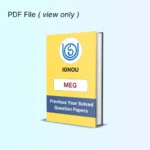IGNOU MEG-07 Block 7 Summary | Poetry
- Last Updated On October 14, 2025
Table of Contents
Here you will get the detailed summary of IGNOU MEG 7 Block 7 – Poetry.
We have provided the summary of all units starting from unit 1 to unit 6.
Introduction
IGNOU MEG-7 Block 6, titled The Short Story, explores the development and diversity of the short story form in Indian English literature. This block introduces readers to the theoretical framework of the short story as a genre and offers in-depth discussions of key Indian authors who have significantly contributed to this literary form. Through a range of representative voices—from early modernists to contemporary writers—the block examines how the short story has evolved as a vehicle for exploring Indian life, identity, gender, culture, and social transformation in a concise yet powerful narrative mode.
Unit 1 – Background to Indian English Poetry
This unit provides the historical and cultural background necessary to understand the emergence and development of Indian poetry in English.
-
Indian English poetry began during the colonial period, influenced by British literary models and education.
-
The early poets were largely Western-educated elites, who tried to emulate the styles and themes of Romantic and Victorian poets.
-
Gradually, Indian poets began to infuse Indian ethos, myths, and social realities into their verse.
-
Post-independence poetry witnessed a shift toward introspection, identity, urban concerns, and experimentation in form and language.
Key themes discussed:
-
Colonial encounter and mimicry
-
Search for indigenous voice in a foreign language
-
Evolution from imitation to innovation
Unit 2 – Henry Derozio and Toru Dutt
Henry Derozio:
-
Considered the first Indian English poet.
-
Influenced by English Romanticism, particularly Byron and Shelley.
-
His poetry is marked by patriotic fervour, reformist zeal, and classical imagery.
-
Works like The Fakir of Jungheera show his commitment to social reform and national awakening.
Toru Dutt:
-
A pioneering woman poet with a tragic but impactful literary career.
-
Wrote in both English and French, blending Indian mythology with European literary form.
-
Her poetry reflects:
-
Cultural synthesis
-
Longing for home and identity
-
Tragic awareness of mortality
-
-
Her celebrated work Ancient Ballads and Legends of Hindustan revitalized Indian themes in English verse.
Unit 3 – Sri Aurobindo and Sarojini Naidu
Sri Aurobindo:
-
Poet, philosopher, and spiritual leader.
-
His poetry is symbolic and metaphysical, drawing from Indian spiritual traditions and epic frameworks.
-
Major work: Savitri – a spiritual epic, dealing with human consciousness and divine evolution.
Sarojini Naidu:
-
Known as the Nightingale of India, her poetry is lyrical and musical.
-
Themes include:
-
Indian life, festivals, nature
-
Love and patriotism
-
Feminine experience
-
-
Blends Romantic diction with Indian imagery, capturing the beauty of Indian culture with emotional intensity.
Unit 4 – Nissim Ezekiel and Kamala Das
Nissim Ezekiel:
-
Often called the father of modern Indian English poetry.
-
Brought poetry closer to urban, everyday Indian experience.
-
Wrote in a conversational tone, with irony, self-reflection, and cultural critique.
-
His famous poems like Night of the Scorpion and The Professor reflect middle-class life with subtle humour and insight.
Kamala Das:
-
A bold, confessional poet, exploring female desire, identity, and emotional vulnerability.
-
Her poetry is known for:
-
Autobiographical intensity
-
Sensuality and rebellion
-
Candid treatment of love, loneliness, and societal expectations
-
-
She challenged conventional roles and wrote with raw honesty and power.
Unit 5 – A.K. Ramanujan, Arun Kolatkar, and Jayanta Mahapatra
A.K. Ramanujan:
-
A bilingual poet and scholar known for cultural hybridity and personal introspection.
-
His poetry often deals with:
-
Memory and tradition
-
Family and identity
-
South Indian culture
-
-
His style is understated, subtle, and deeply intellectual.
Arun Kolatkar:
-
Known for experimental and postmodern style.
-
Jejuri, his famous collection, blends spiritual inquiry with irreverence, documenting a pilgrimage through irony.
-
His poems have a minimalist structure and focus on ordinary life and disillusionment.
Jayanta Mahapatra:
-
One of the first Indian poets writing in English to gain international acclaim.
-
His poetry reflects:
-
Odisha’s landscapes and rituals
-
Guilt, silence, and historical trauma
-
-
Known for dense imagery, moral introspection, and philosophical questions.
Unit 6 – R. Parthasarathy and Keki N. Daruwalla
R. Parthasarathy:
-
His seminal work Rough Passage explores:
-
Diasporic identity
-
Loss of roots
-
Struggle between English and mother tongue (Tamil)
-
-
He views English as both a burden and a means of expression, reflecting postcolonial ambivalence.
Keki N. Daruwalla:
-
A poet of violence, history, and social conscience.
-
His poetry is marked by:
-
Vivid imagery
-
Political awareness
-
Sharp critique of corruption and injustice
-
-
Uses both historical allegory and realist narrative to question societal decay.
